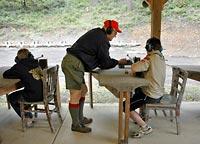Scout camp is the job of his life

Bill Montgomery believes that if the Boy Scouts of America can keep a kid through his first year of Scouting, he'll stick with the program till he's 18.
Or maybe a teensy bit longer.
Montgomery has been registered with the Scouts since he was 8. This summer, he turns 66.
Since 1961, Montgomery has been a scoutmaster (Troop 166 in Wedgwood, near his Laurelhurst condo). And for nine weeks in the summer (eight weeks of campers and one week to prepare for them), he packs up for Camp Parsons on Hood Canal, where he is the shooting-sports director in charge of archery and rifle programs.
"I've done every job from basic runt to camp director," Montgomery said. "And rifle range is one of the best jobs in camp."
And not a bad place to work, either. Camp Parsons, which sits on the waterfront near the small town of Brinnon in Jefferson County, is one of three camps run by the Scouts' Chief Seattle Council, which serves King, Clallam, Jefferson, Kitsap and North Mason counties. Opened in 1919, it's one of the oldest Scout camps in the nation.
They are among approximately 12,000 summer camps across the nation that serve about 10 million children and adults a year, according to the American Camp Association. Nonprofit organizations, including the Boy Scouts of America, Girl Scouts of the USA, YMCA, YWCA, Camp Fire USA, churches and synagogues, operate 78 percent of all summer camps, according to the association. That means many opportunities for people drawn to the seasonal work.
The Chief Seattle Council employs 100 full- and part-time workers year-round, said marketing director Amy Faulk, and about 200 seasonal, paid camp-staff members.
Scouts as young as 14 can become counselors-in-training at camp, she said, though they are not paid. Once they hit 16, though, the money starts rolling in. Well, some money, anyway. Faulk said the average pay range for camp staff is $800 to $2,000 for the whole summer.
"It's pretty hard to say, 'Earn big money so you can go to college,' " Montgomery said. "But you do get room and board for the summer, so there's not much in the way of expenses. Quite often, people are making a sacrifice because they enjoy what they are doing."
Though Montgomery enjoyed going to camp as a child, he didn't plan to work there. But then a friend asked him to help run a troop for a weekend camp, and he liked it. So when he was asked to take his old troop to camp, he took on the challenge.
"Our troop was not very well thought of — spoiled rich kids from Laurelhurst and Windermere who caused trouble. But I managed to calm them down and turn them into winners, and it made me look like a leader. I started as a business manager and have been doing it ever since."
Before he retired, Montgomery taught school for 33 years. (One reason: summers off for camp.)
"Camp staffing is more fulfilling," he said. "The kids are there because they want to be, for the most part. A lot of kids in school weren't all that happy to be there and didn't view the time they spent with me as necessarily to their advantage."
But get them on a rifle range, and you've got their attention.
"The kids are usually very cooperative," said Montgomery, who is certified by the Scouts' National Camping School and the National Rifle Association. "They will do what you want of them, as long as they get to shoot. They are very motivated."
Other camp jobs require specific certifications, too, Faulk said — for example, climbing-wall directors, lifeguards and health officers — and there are age requirements for certain positions. (All adult leader membership applicants must undergo and pass criminal-background checks.) And, while an applicant does not need Scout experience to join the camp staff, he must become a member before assuming any work responsibilities.
That does not mean women are excluded.
"Some of the females on staff are daughters of Scouts, not Boy Scouts themselves, but with a connection to camp," Montgomery said. "They knew what they were getting into."
And that can be one tough job. Though camp lasts only eight weeks, it's a rigorous eight weeks. This summer, Montgomery said, the camp expects 2,800 boys, ages 10 ½ to 18 — more than anyone can remember.
And most camp-staff jobs are 24/7, he said, with just 24 hours off on weekends. That's fine for Montgomery — for camp quarters, he has a three-room house on the water.
Then there's the busy camp routine. Reveille at 7. Dining-hall meals. Hiking. Homesickness. And campfires. After more than 50 years in Scouting, Montgomery has attended lots of campfires and still enjoys them.
" 'Kumbaya' is one of our standards," Montgomery said. "Not only do I know all the words, but I know several different versions."

Camping for dollars
![]()
![]()
Here are some places to look for summer-camp jobs:
American Camp Association: www.acacamps.org/jobs
CampJobs.com: www.campjobs.com
Camp Channel: www.campchannel.com/jobboard
Local Boy Scouts:
• Chief Seattle Council (King, Clallam, Jefferson, Kitsap and North Mason counties), 206-725-5200, www.seattlebsa.org :
• Pacific Harbors Council (southwestern Washington counties, including Pierce, Thurston and South King counties): www.pacificharbors.org; 253-752-7731;
• Mt. Baker Council (Snohomish, Skagit, Whatcom, Island and San Juan counties): www.mtbakerbsa.org; 425-338-0380.